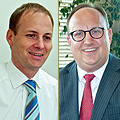| Published: Date: Updated: Author: |
The Bahamas Investor Magazine January 21, 2015 January 21, 2015 Catherine Morris |
At the core of The Bahamas’ financial services sector are its people—professionals who bring their expertise to bear on the challenges and issues facing the country’s second largest industry. The Bahamas Investor talks to three movers and shakers in the industry to find out how they are contributing to the sector, how they see The Bahamas developing as an offshore hub and their predictions for the future.
Derek Pattison, vice president and head of wealth management, Scotiabank Bahamas
Derek Pattison (small photo, right) believes the future is bright for The Bahamas. The vice president and Scotiabank’s head of wealth management says the country’s reputation and experience continues to pull in business. “There are some real selling points when you look at what The Bahamas has to offer—its regulatory regime, its independence, the confidentiality,” he says. “These are huge positives for The Bahamas [as well as] the depth of experience, the depth of the talent and the years of history. Business has grown slowly and steadily over the years based on the same client need—the need for investment in a third party nation that is stable. For all the reasons it has grown, I think it will continue to grow.”
Pattison is excited to be part of a sector that is growing and evolving and says he is particularly impressed with The Bahamas’ Ministry of Finance’s drive to introduce more creative initiatives to increase the client base. “[The government] is focusing on various innovative and progressive ways to attract more investment. That is good to see.”
Pattison knew from a young age that he wanted to follow his banker father into finance. “I was destined to be a banker,” he says. “I always wanted to be in finance.” He worked for a brokerage firm in Canada for several years before joining Scotiabank where he has been for the past 10 years. In April 2014, he and his family moved from the bank’s Toronto offices to The Bahamas branch—a move that Pattison considers one of the high points of his career so far.
“This is a highlight,” he says. “I feel very lucky to have had the opportunity to come here, to live in The Bahamas and lead an amazing team.”
The bank VP says he is also lucky to be working for an institution with a proven track record in the region. Scotiabank has 21 branches across the Caribbean region (including The Bahamas) and has been in this part of the world for more than 125 years. The bank also has a strong presence in Latin America with 11 branches there. Pattison says these are “growth markets” for the bank and believes that, with the number of HNWIs in Latin America increasing year on year, they will continue to present an “exceptional opportunity” in the long term.
“The Caribbean and Latin America is where we are focused,” Pattison says. “We are trying to bring that international focus. It makes sense for us to be plugged into our partners. It is the network we can bring in from abroad that is going to help us grow this business. We want to make sure our partners know where we are and what we do. I am very lucky to be at the helm of a business that is poised for growth.”
Bringing about this growth is very much a team effort for Pattison, who adds: “The best way to run a business is to be measured on people’s success. I have always tried to surround myself with great people and give them the freedom to grow and innovate.”
Michael Schultz, senior manager, KRyS Global
Michael Schultz (small photo, left) joined The Bahamas branch of financial advisory group KRyS Global in February 2014 after working for accounting firm KPMG in the Channel Islands. His first impressions of his new home as a financial centre were very favourable.
“When I look at the services The Bahamas offers, they are quite balanced. Other jurisdictions have a focus, but lack the diversity,” he says. “Because The Bahamas has a little bit of everything there is a chance to look for opportunities in each of those sectors. The infrastructure is there and can be built upon.”
The lifestyle and location of the archipelago also plays a part in luring clients to its shores, according to Schultz, who says: “I believe the quality of life in The Bahamas, coupled with its location, is why The Bahamas is so successful in attracting high-net-worth individuals (HNWIs). A lot of other offshore centres try to attract wealthy individuals, but if you don’t have sunny weather and beautiful beaches, it is a difficult job. What The Bahamas has to offer is really unique.”
Schultz is no stranger to offshore financial centres and the issues that come with such jurisdictions. In 2005, he transferred from the KPMG offices in Germany to their branch in the Cayman Islands where he spent four years working on complex international fund liquidations, forensic investigations and regulatory matters. “Cayman was a very hedge- fund-centric environment,” he says. “The majority of the work was about advising the funds industry.”
In 2011, Schultz moved again, this time to the Channel Islands, which he describes as being an easy transition. “The only adjustment was the weather,” he says. By the time Schultz came to The Bahamas three years later he had gained invaluable experience in the offshore sector.
Having assisted lawmakers and policy setters on many occasions during his career, Schultz has seen firsthand the difficulties of balancing the competing interests of industry, regulators and government. He says that the increased burden of regulation in recent years has forced many banks to consolidate their assets and restructure their businesses to become more competitive. He believes this same drive to increase profits and become more efficient has led to shrinkage in the market. “It is about economies of scale,” he says. “This is the same reason why small trust companies have started merging and becoming bigger players.”
Despite the complexity and cost of greater regulation, Schultz remains optimistic about the future of jurisdictions such as The Bahamas and says there will always be a market for offshore services. “I think it is unrealistic to believe international cooperation goes as far as a harmonization of tax laws. At present it is about exchanging information, so there will always be the opportunity for offshore islands to have their tax autonomy and develop a financial industry around it in line with international regulations.”
 Courtney L Pearce, partner, Callenders & Co
Courtney L Pearce, partner, Callenders & Co
Courtney L Pearce, partner at Nassau law firm Callenders & Co, agrees that greater regulation—along with more competition and an increasingly globalized financial environment— has buffeted the sector in recent years, saying: “As an attorney, I think we are moving into very interesting times.”
She predicts that the impact of the US Foreign Accounts Tax Compliance Act (FATCA), which comes into force this year, will provide opportunities for skilled lawyers, but open the industry up to greater competition. “We are going to see a lot more challenges to trusts as people try to navigate through FATCA, and others navigate into trusts. People are going to be asking ‘what do these changes mean for us?’
“We are going to face competition from areas we have not faced before, such as onshore entities. We are going to have to up our products and our services and continue to be innovative in marketing ourselves and our products.”
Despite the uncertainty in the industry, there are reasons to be optimistic, according to Pearce. “Even though we are facing competition, we have the background, the experience and the capability to be able to deal with it.”
Pearce “always knew” she wanted to go into law, but it wasn’t until years later, during a summer internship at Nassau firm Graham Thompson, that she discovered an affinity for trust law in particular. “I am inquisitive. I love learning and I like a good fight. I really enjoy the challenge of not only presenting my client’s position, but also convincing a court that I’m correct,” she says. “I like the complexity of [trust law]. It leads to a lot of really interesting arguments sometimes. You are always refining the law.”
The ambitious litigator joined Callenders & Co shortly after graduating from the University of Buckingham in the UK in 2006 and, in February 2013, became the firm’s youngest partner. “It was exciting and a great privilege,” she says of her promotion. “Most of the partners are experts in their fields, so it was great to join their ranks.”
Pearce recently accompanied another Callenders partner, Llewellyn Boyer-Cartwright, on a trip to Shanghai to attend the China Offshore Summit. China, says Pearce, is a crucial market for The Bahamas given the number of ultra-HNWIs in the country who are seeking a secure haven for their funds.
“With the amount of money in China now, that is somewhere we should be,” she says. “One of the main things we need to do is get our presence there. Our goal should not be to bring the Chinese here as tourists, they already have sun, sand and sea nearby. The draw for the Chinese is really going to be what our financial services sector can provide—funds in a stable economy and access to the rest of the world.”
Another possible avenue of growth for the legal sector is acting as an intermediary between the Latin American and Chinese markets, according to Pearce who says Chinese investors are keen to access Latin American services. “China is after Latin America, and Latin America is after China. We want to facilitate services going from one to the other [with] foundations, conglomerates, trusts. We can offer that stability.”
The watchword for the financial services sector in the future will be security, predicts Pearce. As cautious investors try to weather the economic storms, they will seek out experienced and capable providers, she says. “The entire world is facing difficult economic times. It has become about trust structures that will not only allow for investment, but also provide protection. If we stay on top of client needs, see the way the world is going and anticipate changes, we will continue to have success.”










